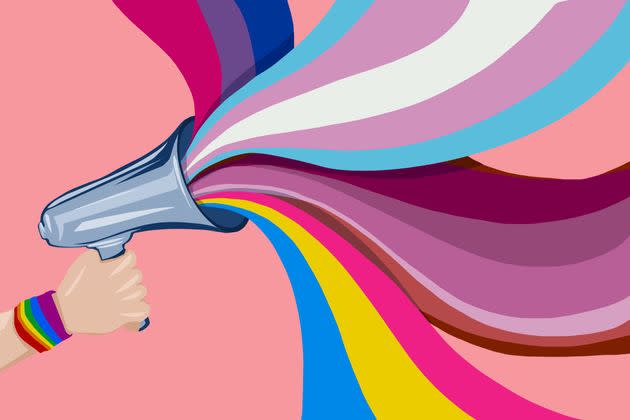National Coming Out Day Has A Hidden Problem

(Photo: Dusan Stankovic via Getty Images)
The internet exploded this week after Madonna, Emily Ratajkowski and Shay Mitchell all allegedly “came out” back-to-back on TikTok. But if you bothered to watch the videos, you might be a little confused: For one, not one of the celebrities actually uttered the words “I’m queer.” But, more important, all of the above have expressed their queerness before, even if they never necessarily used words like “lesbian” or “gay” to describe themselves.
The viral TikToks were posted just before National Coming Out Day on Tuesday, which seems like the right time to reexamine why so many of us are still obsessed with declarative “coming out” announcements à la YouTube of the early 2010s.
On the one hand, coming out publicly serves an essential function for queer and trans kids who don’t have access to thriving, openly queer adults. It is a form of visibility, and I get that. On the other, obsessing over the semantics of a celebrity’s sexual preferences in 2022 is starting to feel a little weird. Somehow we are at a place in history where hopping on a viral TikTok trend is what legitimizes someone’s queerness, which begs a juicier question: Do we only take people’s gayness seriously when they put on a show to express it?
National Coming Out Day was first celebrated on Oct. 11, 1988, on the anniversary of the National March on Washington for Lesbian and Gay Rights, according to the Human Rights Campaign. It was at the height of the AIDS crisis, and, much like today, politicians were fighting hard to make queer and trans people less visible. Coming out continues to be an act of bravery, but it is still, first and foremost, a decidedly personal act.
Queer people are not a monolith, and not all of us feel authentic by declaring our gender or sexual identities for everyone on social media. In addition, some people are not comfortable identifying with labels that can feel personally limiting. If “mainstream society” wants to see queer people thrive, everyone should be willing to take us seriously even when we don’t use words that compartmentalize us or make us more palatable.
What I’m really trying to say is that I didn’t feel like Madonna, Ratajkowski or Mitchell “came out” this week at all. They’ve been talking about their queerness for a long time, and what actually happened is that no one was listening. In 1991, Madonna told The Advocate that she thinks “everybody has a bisexual nature,” which clearly meant that, as part of the human race, she has a bisexual nature. In a 2019 Harper’s Bazaar essay, Ratajkowski wrote about understanding that sexuality is a spectrum as well as her fixation on whether she presented femme or masc.
In a 2017 interview, Mitchell said she doesn’t label herself but has always felt attracted to women. The point of National Coming Out Day should be to give queer people the choice to express their queerness however they want. If we want to celebrate it successfully, we all have to stop fixating on a very narrow type of coming out that actually makes queerness seem unusual rather than something that is all around us all the time.
We deserve a culture in which queer people can come out by choreographing a dance but also one in which someone can say they are figuring it out or are attracted to all people and we leave it at that. Queer and trans people don’t owe us viral and easily digestible “coming out” moments. In a world where we are already asked to give so much of ourselves, the least we should be granted is the right to articulate our identities however the hell we want.
This article originally appeared on HuffPost and has been updated.
